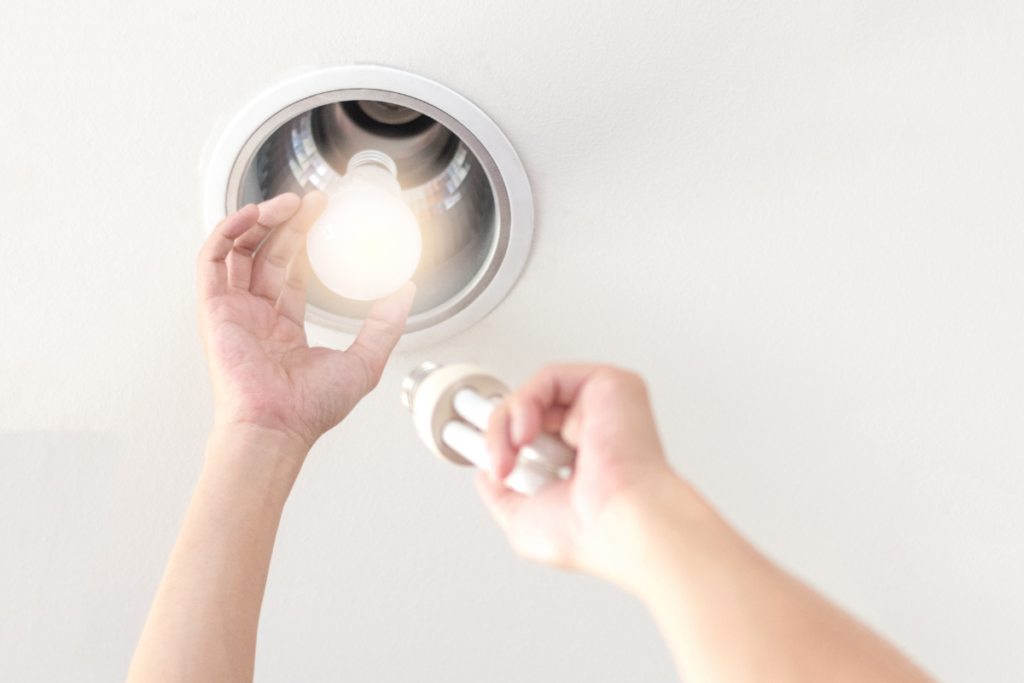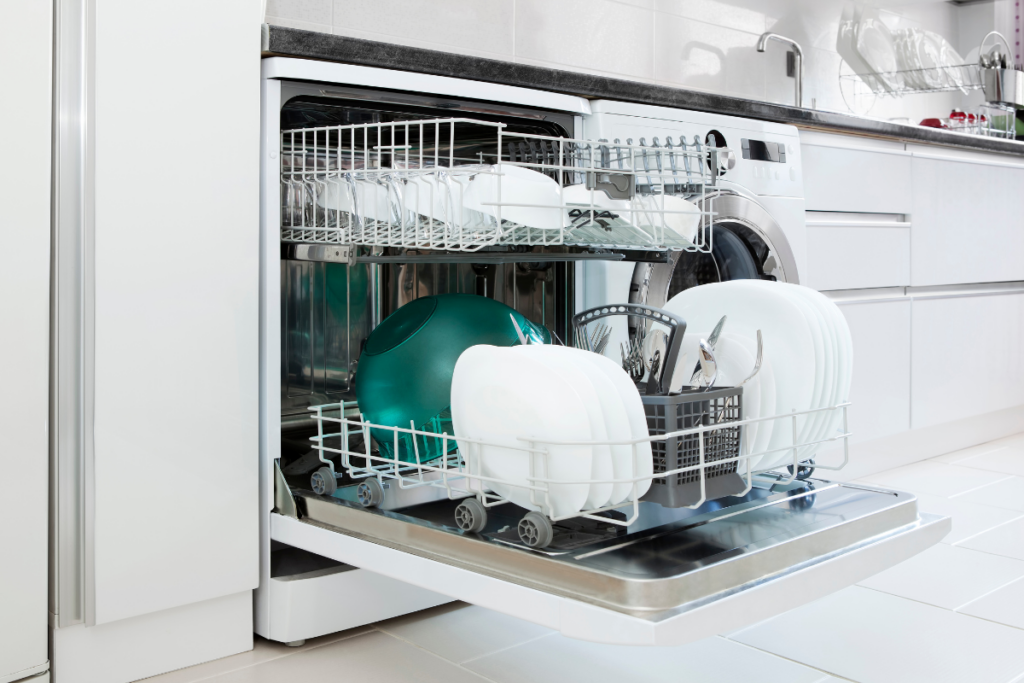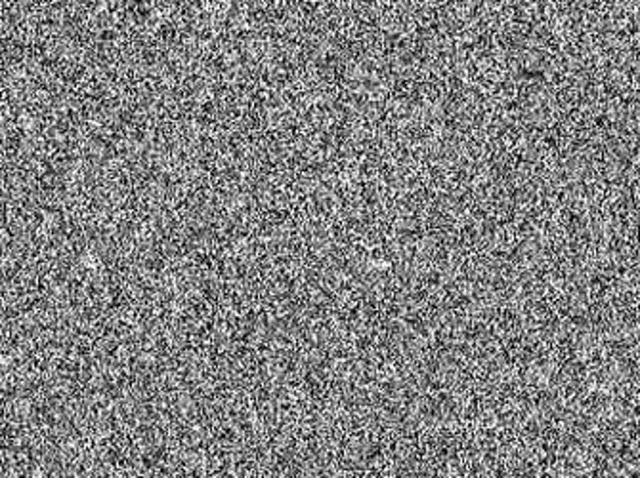Why Do Lights Flicker When the Dishwasher Is On? [10 Troubleshooting Tips!]
It can be surprising and bothersome if the lights in your home flicker when the air conditioner starts up in the middle of summer, but what if it’s happening with a less obvious large appliance? Have you stopped to wonder why lights flicker when the dishwasher is on?
Your lights may flicker when the dishwasher runs due to the amount of power required to wash, sanitize, and dry the dishes. Typically home lights will dim momentarily, but quickly return to normal. If the flickering continues, there may be a loose wire, the power supply may be insufficient, or there may be an underlying problem with the dishwasher.
Keep reading for the top ten reasons your lights may be flickering when the dishwasher is on, as well as what you can do to stop it.
Why do lights flicker when the dishwasher runs?
Like most other large appliances in your home, the dishwasher requires a large amount of power to function. At each stage of the cleaning cycle, your dishwasher will pull a burst of power, which can cause the lights in your home to flicker. Why does this happen?
A lightbulb will dim or flicker because it’s either not getting enough power or not getting a steady stream of that power. Basically, either there’s not enough power available to run both the dishwasher and the light, or something is causing the power to be delivered inconsistently.
The specific reasons either of the occurs may take various forms and may require a bit of troubleshooting to figure out.
Why do LED lights flicker when the dishwasher runs?
According to the 2020 Residential Energy Consumption Survey, 47% of U.S. households report using LED lights for most – if not all – of their indoor lighting. This number is up from only 4% just five years prior. Given the dramatic upswing in use, it’s not surprising to find some households are starting to notice the subtle difference between these energy-efficient light bulbs and the previously ubiquitous incandescent bulbs.

Namely, it’s not uncommon for LED lights to flicker periodically throughout the day, especially when a large appliance such as the washing machine or dishwasher starts up.
The LED lights in your home may flicker when the dishwasher runs because they are more sensitive to fluctuations in power than other types of bulbs. This will be especially true if the LED light is controlled by a dimmer switch.
If you have a variety of types of lights, take notes of which ones are flickering. If only the LED ones are affected, are they the same brand? Sometimes purchasing a higher-quality bulb will solve the problem.
If, however, there doesn’t seem to be an immediate relationship between the affected light, chances are you’re looking at an issue that’s unrelated to the type of bulb. Keep reading for the full list of reasons your light bulb (of any variety) might be flickering.
Top 10 reasons the lights in your home flicker when the dishwasher runs
There are many reasons that the lights in your home may flicker, some of which are incredibly obvious and easy to fix, while others are signs of a more significant problem.

If your lights flicker when the dishwasher runs, it may be because:
- Loose light bulb
- Extra power draw on start up
- Overly sensitive LED lights
- Lights are on a dimmer switch
- Loose plug
- Loose neutral or ground wires
- Dishwasher motor is causing interference
- Dishwasher is damaged
- Inadequate power from the circuit
- Inadequate power from the utility company
Let’s take a look at each of these potential causes in detail.
Loose light bulb
Okay, it may be obvious, but if there’s only one bulb giving you trouble it’s possible the problem is that bulb.
Test the light bulb to ensure that it’s firmly screwed in.
This is likely only to be the solution if one light bulb is flickering, but it’s always worth a try! While you’re at it, you may also want to try replacing the light bulb temporarily.
Extra power draw on start up
If the power only flickers or dims for an instant when your dishwasher comes on, it’s probably not a big problem.
Dishwashers draw extra power when they’re first starting up than they do throughout most of the cleaning cycle. This can cause the lights in your home to fluctuate momentarily.
A flicker when the dishwasher starts up is likely the result of the circuit being momentarily pushed to capacity. If this seems to be your issue, I wouldn’t worry about it unless it gets worse.
Overly sensitive LED lights
LED lights are longer lasting and more energy efficient than traditional incandescent bulbs, but they’re also more expensive. This tradeoff makes sense as you’re not having to buy them as often or pay as much to keep them on.
Poor-quality LED lights can flicker with even minor voltage changes. Swap out one or two led bulbs (that flicker) with a name brand and check to see if the flickering clears.
Since lower-quality LED lights are more susceptible to power fluctuations, replacing the flickering lights with higher-quality bulbs may make all the difference.
Lights are on a dimmer switch
Even if the lights themselves are high-quality, you may still experience an issue with flickering if the lights are connected to a dimmer switch.
Dimmer switches are more susceptible to voltage changes and can cause LED lights to flicker when there is a change.

Confirm that the light bulbs you’re using are made for dimmer switches. Depending on the brand, you may also be able to find a list of dimmers that the bulb has been tested on (like this one from GE).
Loose Plug
You may be thinking this one’s a little obvious and, of course, you checked the lamp’s plug when you checked the light bulb, but have you checked the dishwasher plug?
Many dishwashers are built-in and hardwired into your home’s electricity, but many others are just plugged in underneath your counter. If you’re not sure about yours, try to pull it out; if it comes, unplug it from the outlet and plug it back in.
A loose outlet plug may be causing your dishwasher to draw power inconsistently, forcing it to pull more while it’s connected to make up for the low draw.
Even if this doesn’t solve your problem, chances are it was time for a mop under there anyway!
Loose neutral or ground wires
A loose neutral wire or poor ground connection can cause the lights to flicker.
Pick up an outlet tester from your local hardware store and try plugging it into the dishwasher receptacle. It will be able to tell you if the outlet is wired properly, although a loose wire may register correctly when you’re testing it.
If that doesn’t work, you may want to consider contacting a licensed electrician to inspect your house’s internal wiring.
Top tip: If there’s a burnt eletrical or rubber smell, you may have a loose, sparking, or damaged connection. Turn off the power and call an electrician!
Dishwasher motor is causing interference
Do you remember how old tv shows would look staticky if you didn’t have a good signal? Your dishwasher motor can do something like that to some LED light bulbs.

Electrical interference from the dishwasher’s internal pump may be picked up by the LED circuits causing the flicker.
If you think this is your issue, contact the dishwasher manufacturer for an electromagnetic interference (EMI) filter.
Dishwasher is damaged
In the same way that the motor may cause electrical interference as part of its regular operation, you may be experiencing interference because of a failure in your dishwasher.
Electrical problems including loose wires or sparking connections in your dishwasher can cause the lights in your home to flicker.
You’ll often smell a burnt electrical or rubber odor if this is happening, but that’s not always the case.
Inadequate power from the circuit
The underlying reason that the lights may flicker when your dishwasher is on comes down to not having enough power.
Most dishwashers require a 110V outlet that is connected to a 20-amp circuit, although you should consult your owner’s manual as larger models may require more power. If for some reason the outlet is connected instead to a 15-amp circuit, running the appliance will overload the electrical circuit. You may also experience this problem if the 20-amp circuit is also being used for other devices.
The power drawn by the dishwasher increases during the water heating cycle and can cause a momentary drop in circuit voltage that is picked up by the LED lights and then causes the flicker.
Use a multimeter or AC voltmeter that can record both the minimum and maximum voltage as the dishwasher is running. A significant difference between the minimum and maximum voltage confirms the voltage drop.
If the dishwasher needs a dedicated circuit, contact a qualified electrician.
Inadequate power from the utility
Depending on your power source, dimmed lights may be a sign that your entire electrical flow is lacking.
Most dishwashers need a 20-amp circuit to function properly, but that doesn’t mean anything if the household power supply can’t support the household power usage.
Contact an electrician or your utility provider to determine if there’s an underlying problem.
Summary of why lights flicker when the dishwasher runs
If your lights are flickering when the dishwasher runs, the issue may be with the light bulbs themselves. LED lights are particularly sensitive to the change in voltage that can be caused when the large appliance starts up, and this is doubly true if that light is controlled by a dimmer switch.
Other potential reasons that your light bulbs might flicker when the dishwasher runs include:
- a loose light bulb or plug
- loose neutral or ground wires
- internal damage in the dishwasher
- electrical interference from the dishwasher’s motor
- inadequate power, either from the circuit or to your home
If the flickering is not easily solved or explained, do not hesitate to contact a qualified electrician.
Why do lights flicker when appliances are running?
Lights flicker when appliances are running either because the appliance is drawing more power than the circuit is able to supply or because something is interrupting the flow of power.
While some of the troubleshooting tips available in this post are dishwasher-specific, many of them can be used to diagnose any type of light flickering caused by an appliance.
Do flickering lights indicate an electrical problem?
Flickering lights may be a sign that an appliance is straining the amount of power supplied by the circuit. While this is likely not an immediate problem, it would be wise to contact an electrician and rewire the circuit to supply the appliance with the necessary power.
However, lights that flicker regularly or without obvious cause are an indication of a major problem in the wiring. This may be a loose wire, a sign that something is sparking, or an indication that the circuit is drastically underpowered. Either way, it needs to be dealt with immediately as it may lead to electrocution or a house fire.
Can flickering lights damage appliances?
Flickering lights themselves are unlikely to cause any damage to your appliances, but they may be a sign that there’s an underlying issue that could.
Flickering lights may be caused by abrupt changes in the voltage being supplied to the light bulb. This will cause the bulb to wear out faster, but may also damage your appliances. For example, the compressor in your refrigerator can be damaged by less than 90V or more than 135V.
What would cause kitchen lights to flicker?
The most likely cause of kitchen lights flickering is a bad connection between the light switch and the bulb.
If jiggling the light switch fixes the issue, it’s probably time to replace the switch.
If your light’s turning on and off entirely by itself, however, that’s a completely different problem.
Recommended Posts
Let Us Know How We’re Doing!
Did this expertly prepared resource answer your question?
Do you have another question about home maintenance, home improvement projects, home appliance repair, or something else?
Get more information, send in questions and keep the discussion going by contacting the I’ll Just Fix It Myself company customer service team at at 1-800-928-1490 or Email us at [email protected]
